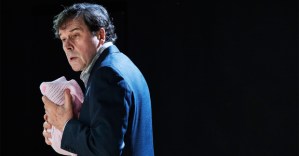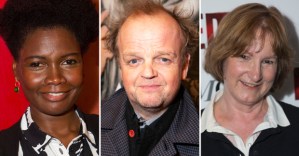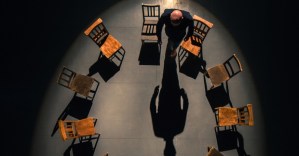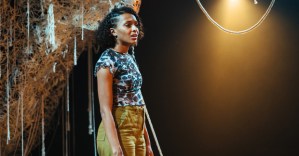Review: Glass. Kill. Bluebeard. Imp. (Royal Court)
Caryl Churchill returns to the Royal Court with four new plays
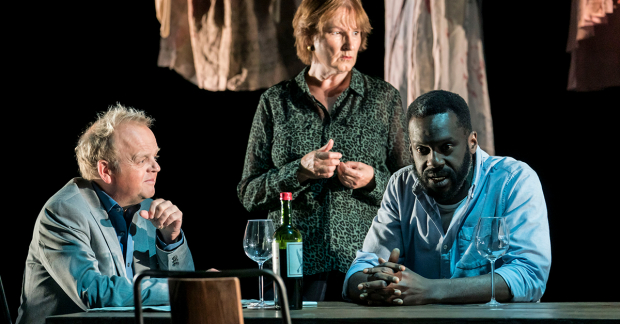
© Johan Persson
Four new plays from 81 year-old Caryl Churchill are an event and a treat. All her work is precision-engineered but her late plays feel like Picasso's late sketches. The line is so fine, the image ferociously truthful, pared to the bone yet rich in implication.
As these pieces show, she continues to adventure and to explore. They increase in length as the evening proceeds, the first three separated by interludes of magical, transfixing juggling and acrobatics, the longest Imp, playing after the interval. All are set by designer Miriam Buether and lighting designer Jack Knowles, within a glowing frame of lights, like musical hall attractions; the red curtains draw back to reveal shadow-sculpted spaces with minimal props.
All are directed by James Macdonald with a depth of care and understanding that springs from deep respect for the author. Although each has a different mood and theme, all are bound together by a common interest in myth and the human need to create stories that explain the violence and anxiety that Churchill depicts as churning beneath the apparent normality of life.
Glass, the first play, is the most allusive but also haunting and poetic. It features "A girl, made of glass", and her friend whose father abuses him. It also contains a short scene in which the line of ornaments on a mantelpiece talk to one another; funny and clever, it ends with a devastating moment of abnegation, summoning all kinds of emotion through its surreal imagination, and beautifully played by all its cast particularly Rebekah Murrell as its fragile heroine, who "looks like people look".
Churchill's capacity to take something familiar and examine it in unfamiliar ways is also on display in Kill in which Tom Mothersdale perches on a cloud to play the Gods ("we can't do everything…we don't exist") gazing down on the People (embodied by a boy drawing fiercely) and recites with increasing anger and despair the endless story of killing in the cursed House of Atreus. "They sacrifice their children quite easily when there's a war to be won."
The following piece, Bluebeard's Friends, imagines a dinner party where a sophisticated foursome learn that their mate Bluebeard was a serial killer. The words drop like stones on a pond, creating endless ripples. "With hindsight, all those weddings," drawls Deborah Findlay, with exquisite comic brio. The play deftly skewers the reactions to all the men revealed as predators by MeToo ("He played the piano beautifully") but it probes somewhere deeper and more unsettling too ("Do you think only good people have friends?"), asking questions about our attitudes to violence, our willingness to exploit horror. All are powerfully raised by Macdonald's direction which embellishes and enriches the text on the page and by the timing and intensity of Findlay, Toby Jones, Sarah Niles and Sule Rimi.
That same sense of a world gone awry, of the darkness lurking outside a circle of light, fills Imp too. Here Findlay and Jones play Dot and Jimmy, ill-matched cousins living together and longing to offer succour and support to their young relation Niamh (Louisa Harland, nervously uneasy) and Rob (Mothersdale, charismatic but unsettling) a homeless man Jimmy has befriended on the endless runs he takes to combat his depression. The writing is sharp and the performances wonderfully funny; Findlay and Jones mine every line so the words become expressive of all kinds of things they cannot quite say.
Fear and anger are everywhere, real and imagined. Jimmy brings home stories from Shakespearean and Greek tragedies, telling them as if they were everyday encounters. Housebound Dot hides a terrible secret – and an imp, in a bottle. It's slightly over-long but profoundly troubling, full of unease, of things unspoken and not understood. It's a fine conclusion to a magnificent, invigorating night at the theatre. With juggling. And how often can you say that?




